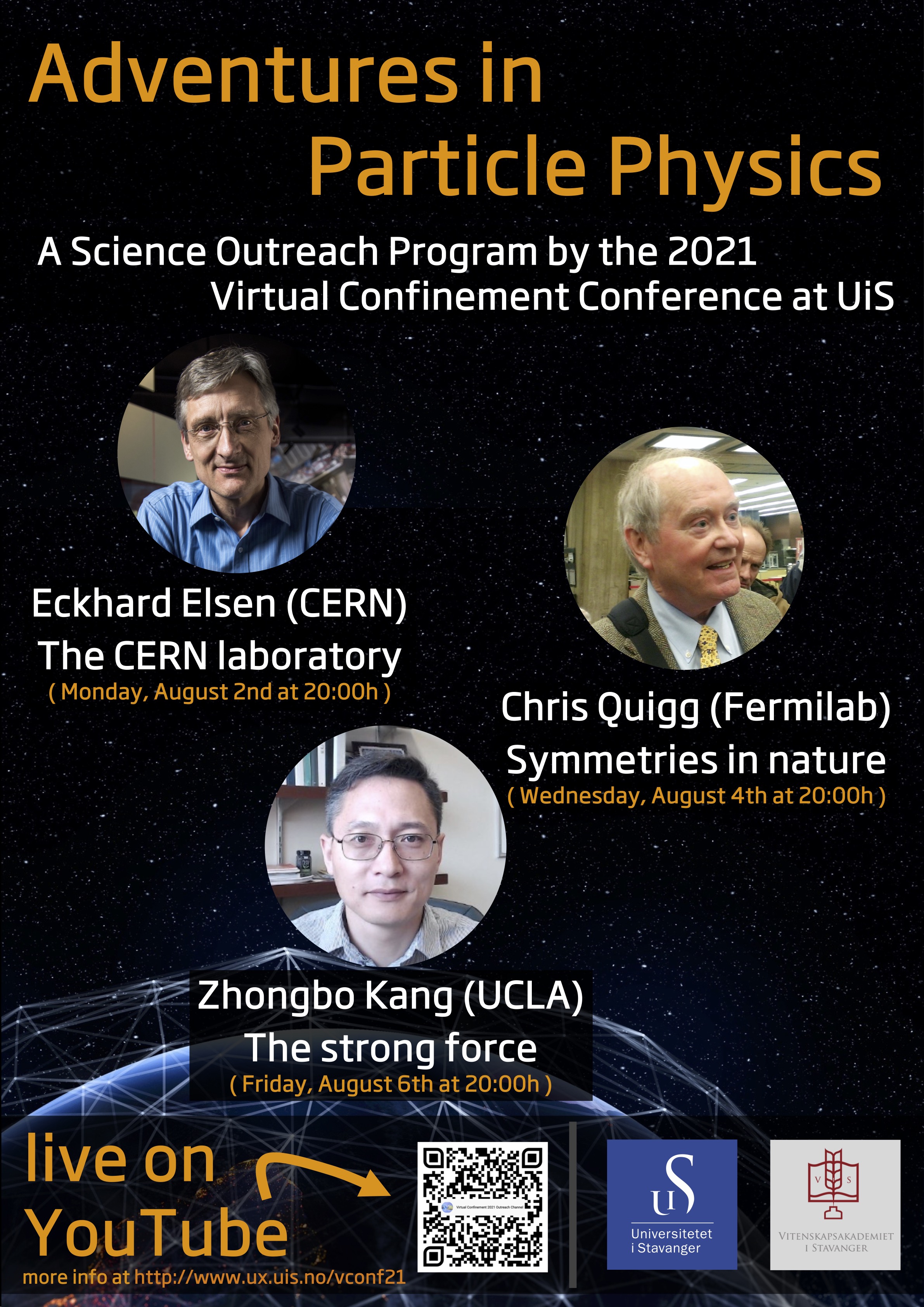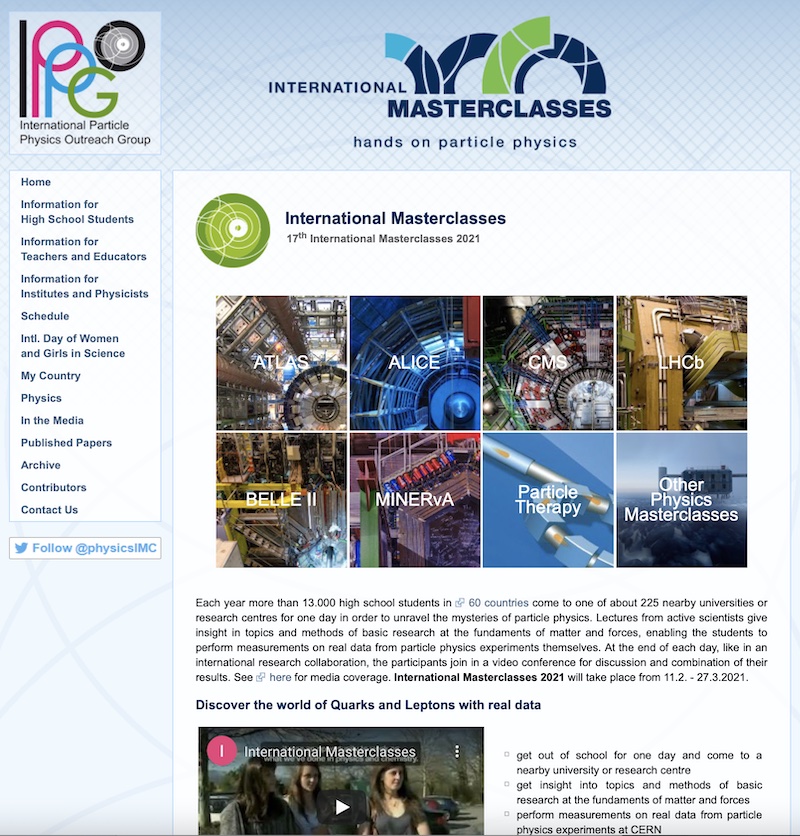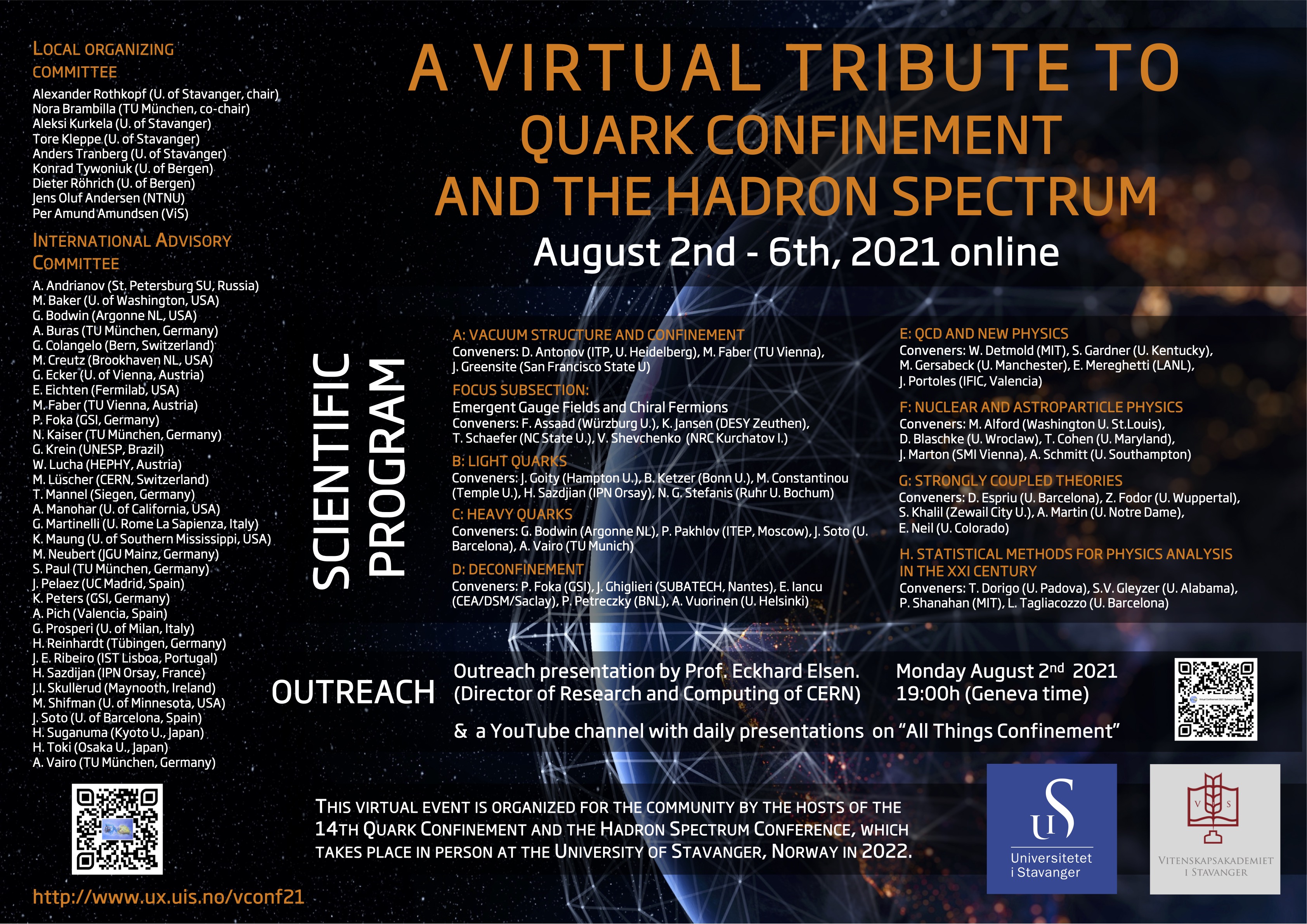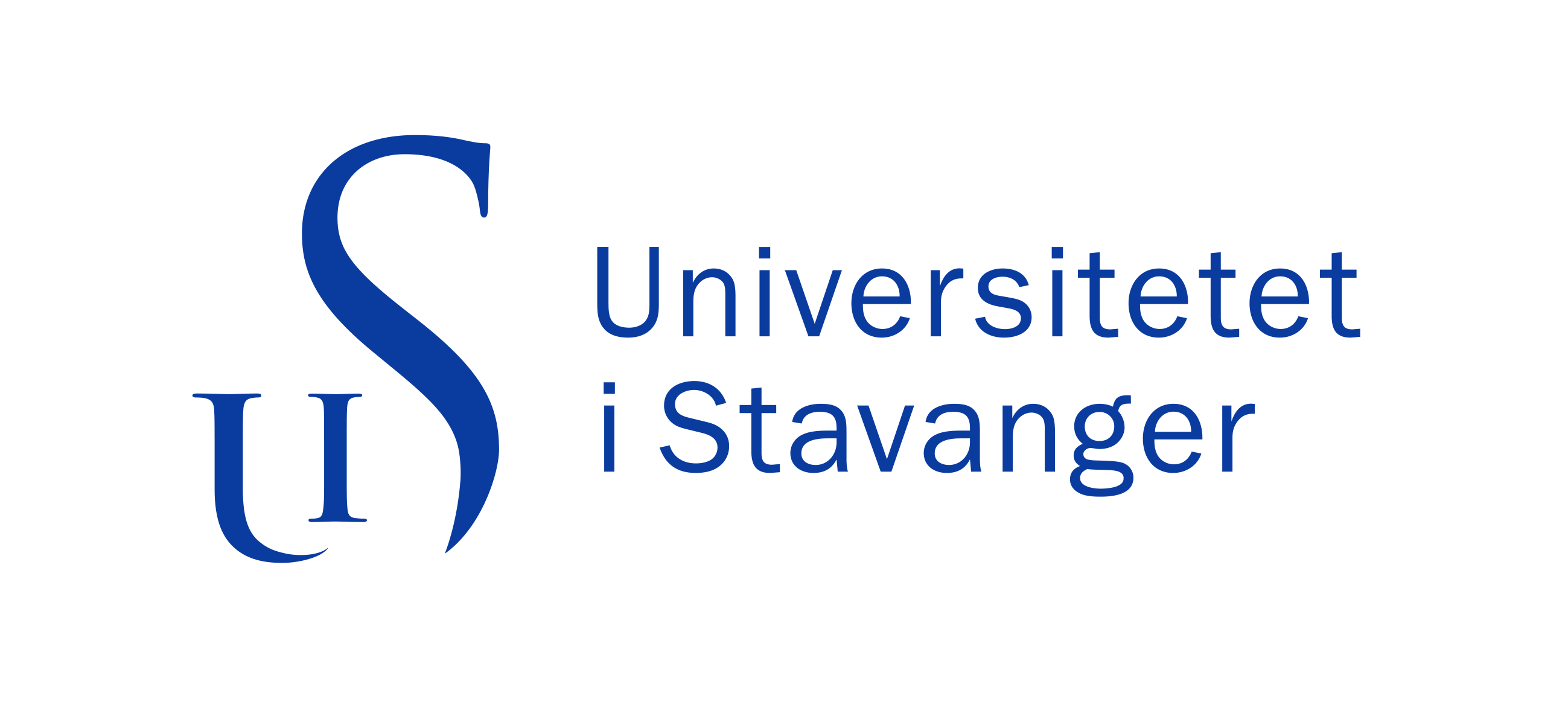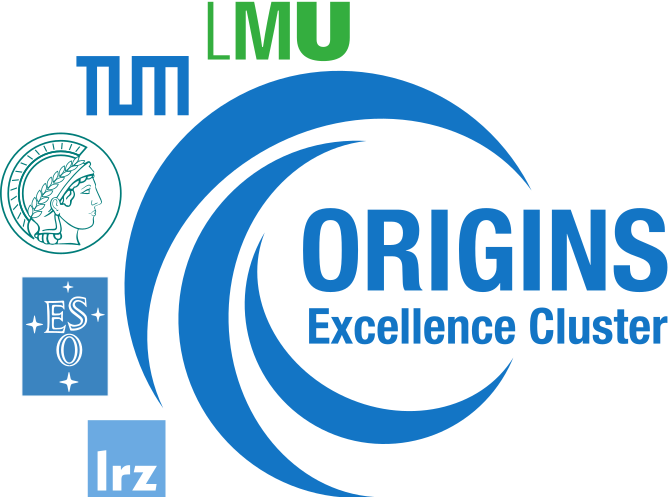A Virtual Tribute to Quark Confinement and the Hadron Spectrum
August 2nd-6th 2021, online
This virtual event is organized for the community by the hosts of the 14th Quark Confinement and the Hadron Spectrum Conference, which takes place in person at the University of Stavanger, Norway in the summer of 2022.
Abstract submission & Registration via IndicoContact the local organizers: via email
About the virtual event
With the Corona pandemic far from over and the prospect for a return to a perceived normal only at the end of 2021, the organizers of the 14th Quark Confinement and Hadron Spectrum conference have decided to postpone the in-person conference in Stavanger, Norway between August 1st - 6th, 2022 (for updates see the ConfXIV website).
At the same time the community is weathering the storm and those of us who are privileged enough can uphold their research activities. To keep the momentum of the community alive and to further exchange among practitioners in the field amidst limited options for travel, we thus invite you to join our virtual event from August 2nd-6th 2021. In the spirit of the QCHS conference series it will feature plenary talks, roundtable discussion and parallel contributed talks. Its schedule will consist of a program of reduced length of 4 hours each day, staggered from day to day, in order to accommodate a global audience.
Abstract submission and registration are open on our Indico page from December 14th 2020. More information about the virtual venue and practicalities will be made available in the coming months.
Important Dates
| Abstract submission opening: | 14 December 2020 |
| Abstract submission deadline: | 17 May 2021 |
| Abstract submission acceptance notification: | 1 June 2021 |
Note that participation in the event is free of charge but registration with institutional email address is required.
Proceedings
It is our pleasure to announce that we have partnered with EPJ Web of Conferences to make available proceedings for this virtual event. All invited and contributed speakers are encouraged to prepare a manuscript and we will provide more details about the submission process and manuscript template after the virtual event has concluded.
About the Quark Confinement and Hadron Spectrum conference series
Inaugurated in 1994 in Como, Italy, this series of conferences has become an important forum for scientists working on strong interactions, stimulating exchanges among theorists and experimentalists as well as across related fields.
The aim of the conference is to bring together people working on strong interactions from different approaches, ranging from lattice QCD to perturbative QCD, from models of the QCD vacuum to QCD phenomenology and experiments, from effective theories to physics beyond the Standard Model.
The scope of the conference also includes the interface between QCD, nuclear physics and astrophysics, and the wider landscape of strongly coupled physics. In particular, the conference will focus on the fruitful interactions and mutual benefits between QCD and the physics of condensed matter and strongly correlated systems.
The fourteenth edition of this conference series will be jointly hosted by the University of Stavanger and the Academy of Science Stavanger. The event will take place at the Ullandhaug Campus of the University of Stavanger, Norway, between August 1st - 6th, 2022.
The aim of the conference is to bring together people working on strong interactions from different approaches, ranging from lattice QCD to perturbative QCD, from models of the QCD vacuum to QCD phenomenology and experiments, from effective theories to physics beyond the Standard Model.
The scope of the conference also includes the interface between QCD, nuclear physics and astrophysics, and the wider landscape of strongly coupled physics. In particular, the conference will focus on the fruitful interactions and mutual benefits between QCD and the physics of condensed matter and strongly correlated systems.
The fourteenth edition of this conference series will be jointly hosted by the University of Stavanger and the Academy of Science Stavanger. The event will take place at the Ullandhaug Campus of the University of Stavanger, Norway, between August 1st - 6th, 2022.
Dedication
This virtual event is dedicated to two of our colleagues who recently passed away: Ann Nelson and Simon Eidelman. On Wednesday, August 4th 2021 at 16:10 (EU) - 10:10 (US EDT) we will remember them with talks by Howard Georgi and Edward Shuryak.


Scientific program
A: Vacuum structure and confinement
Mechanisms of quark confinement (vortices, monopoles, calorons...) and the structure of the vacuum in non-Abelian gauge theories. Chiral symmetry breaking, and the Dirac spectrum in the low-momentum region. Studies of ghost and gluon propagators. Confining strings and flux tubes, their effective actions. Renormalons and power corrections. Interface between perturbative and nonperturbative physics.
Focus Subsection: Emergent Gauge Fields and Chiral Fermions
Chiral fermions and anomalous hydrodynamic effects in condensed matter systems, quantum simulators of QCD, topological phenomena in condensed matter systems.
B: Light quarks
Chiral and soft collinear effective theories; sum rules; lattice calculations; Schwinger-Dyson equations; masses of light quarks; light-quark loops; phenomenology of light-hadron form factors, spectra and decays; structure functions and generalized parton distributions; exotics and glueballs; experiments.
C: Heavy quarks
Heavy-light mesons, heavy quarkonia, heavy baryons, heavy exotics and related topics: phenomenology of spectra, decays, and production; effective theories for heavy quarks (HQET, NRQCD, pNRQCD, vNRQCD, SCET); sum rules for heavy hadrons; lattice calculations of heavy hadrons; heavy-quark mass determinations; experiments.
D: Deconfinement
QCD at finite temperature; quark-gluon plasma detection and characteristics; jet quenching; transport coefficients; lattice QCD and phases of quark matter; QCD vacuum and strong fields; heavy-ion experiments. experiments.
E: QCD and New Physics
Physics beyond the Standard Model from hadronic physics, including precision experimental data and precision calculations.
F: Nuclear and Astroparticle Physics
Nuclear matter; nuclear forces; quark matter; neutron and compact stars.
G: Strongly Coupled Theories
Hints on the confinement/deconfinement mechanisms from supersymmetric and string theories; strongly coupled theories beyond the Standard Model; applications of nonperturbative methods of QCD to other fields.
H. Statistical Methods for Physics Analysis in the XXI Century
Machine learning techniques; data fitting and extraction of signals; new developments in unfolding methods; averaging and combination of results.
Round Table Discussions:
EIC Physics (Mon. Aug. 2nd)
A dedicated round-table discussion on the physics challenges and opportunities at the upcoming Electron-Ion collider.
Open Quantum Systems (Tue. Aug. 3rd)
A dedicated ound-table discussion on the application of the open quantum systems framework to strongly interacting systems and beyond.
Machine Learning (Wed. Aug. 4th)
A dedicated round-table discussion on the challenges and opportunities of machine learning for the study of strongly interacting systems.
Special Topical Session: muon g-2 (Thu. Aug. 5th)
With the recent announcement of measurements of the muon g-2 by the FERMILAB muon g-2 collaboration and new developments in the computation of this quantity from first principles lattice QCD we invite four experts in the field to give an overview over the latest developments.
vConf2021 outreach lecture series for the general public
Particle physics tries to answer some of the big questions of humankind, such as “how was the universe born” and “what are we made of”? Through this outreach program, the organizers hope to give the public insight into some of the answers physics can give to these questions.
Since fundamental research is not immediately applicable in the form of products, it often takes decades before it has a direct impact to everyday life. When it does, it however often leads to rapid progress, as was the case with the transistor, the laser or particle beam cancer therapy. Therefore, the organizers are keen to share with the general public what is going on in the research field to which this conference belongs.
We are thrilled to welcome Eckard Elsen, director of research and computing of the CERN laboratory in Switzerland, Chris Quigg, distinguished scientist emeritus at the Fermi National Accelerator Laboratory in the USA and Zhongbo Kang, group leader at the University of California Los Angeles to tell us in everyday language about the role particles play in nature and the strong forces binding them together.
Eckhard Elsen will give a virtual public presentation "The CERN Laboratory" at 20:00h (CET DST) on Monday, August 2nd 2021, Chris Quigg's public presentation "Symmetries in Nature" takes place at 20:00h (CET DST) on Wednesday, August 4th 2021 and Zhongbo Kang's public presentation "The Strong Force" will start at 20:00h (CET DST) on Friday, August 6th. Note that the schedule referes to Central European Time.
All talks will be live streamed via YouTube and you can interact with the speakers via the YouTube live chat. Links are avaialble also via the ConfXIV outreach channel.
Since fundamental research is not immediately applicable in the form of products, it often takes decades before it has a direct impact to everyday life. When it does, it however often leads to rapid progress, as was the case with the transistor, the laser or particle beam cancer therapy. Therefore, the organizers are keen to share with the general public what is going on in the research field to which this conference belongs.
We are thrilled to welcome Eckard Elsen, director of research and computing of the CERN laboratory in Switzerland, Chris Quigg, distinguished scientist emeritus at the Fermi National Accelerator Laboratory in the USA and Zhongbo Kang, group leader at the University of California Los Angeles to tell us in everyday language about the role particles play in nature and the strong forces binding them together.
Eckhard Elsen will give a virtual public presentation "The CERN Laboratory" at 20:00h (CET DST) on Monday, August 2nd 2021, Chris Quigg's public presentation "Symmetries in Nature" takes place at 20:00h (CET DST) on Wednesday, August 4th 2021 and Zhongbo Kang's public presentation "The Strong Force" will start at 20:00h (CET DST) on Friday, August 6th. Note that the schedule referes to Central European Time.
All talks will be live streamed via YouTube and you can interact with the speakers via the YouTube live chat. Links are avaialble also via the ConfXIV outreach channel.
International HEP Masterclass demonstrations for Physicists
At the 2021 virtual confinement conference it is our pleasure to offer you the opportunity to get to know one of the most successful outreach projects in high-energy physics, the International Masterclasses (IMC) – hands-on particle physics.
Using real-world data sets from particle and nuclear colliders, the masterclasses allows students aged 15-19 to experience particle physics fist hand, with events taking place in more than 220 institutions worldwide, spanning 55 countries and reaching more than 13.000 participants.
At vConf21, researchers, who have previously worked as tutor and hosts for the masterclasses will set up demonstrations of the different modules (according to different experimental data) for you, giving you the opportunity to learn how to hold such an event at your own institution. You will have the chance to select two demonstrations according to your interest among:
ATLAS Z
ALICE Strangeness
Belle II
CMS
MINERvA
ALICE RAA
Particle Therapy
Please use the dedicated registration form to sign up for the event. (Those of you who have already signed up, please check whether you can update your registration with the choice of demonstrations and if not possible, send us an email with your choices.)
Each demonstration will be held twice, so that you can select two out of these six. In addition we will schedule an introduction to the master class on particle therapy for everyone, as an impactful example of basic research affecting society.
Introduction to the IMC program by Kenneth Cecire, one of the coordinators of the IMC (20 min)
Brief introdcution to the Particle Therapy Masterclass, from fundamental research to applications for society, by Yiota Foka (15 min)
1st round of HEP demonstrations: your choice 1/6 (45 min)
Break (10 min)
2nd round of HEP demonstration: your choice 1/6 (45 min)
Closing (10 min)
Using real-world data sets from particle and nuclear colliders, the masterclasses allows students aged 15-19 to experience particle physics fist hand, with events taking place in more than 220 institutions worldwide, spanning 55 countries and reaching more than 13.000 participants.
At vConf21, researchers, who have previously worked as tutor and hosts for the masterclasses will set up demonstrations of the different modules (according to different experimental data) for you, giving you the opportunity to learn how to hold such an event at your own institution. You will have the chance to select two demonstrations according to your interest among:
Please use the dedicated registration form to sign up for the event. (Those of you who have already signed up, please check whether you can update your registration with the choice of demonstrations and if not possible, send us an email with your choices.)
Each demonstration will be held twice, so that you can select two out of these six. In addition we will schedule an introduction to the master class on particle therapy for everyone, as an impactful example of basic research affecting society.
Program starts Tuesday August 3rd, 11:30h (EU) – 5:30h (US East) – 18:30h (JPN)
Outreach
Local organizing committee
International Advisory Committee
